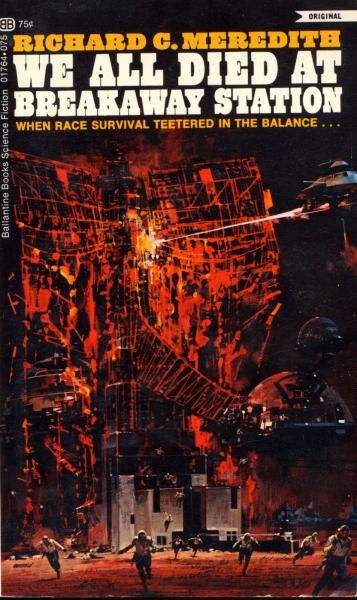Forlorn Hope
We All Died at Breakaway Station
By Richard C. Meredith

25 Apr, 2016
Because My Tears Are Delicious To You
0 comments
I could have reviewed Richard C. Meredith’s 1969 novel We All Died at Breakaway Station in my Military Speculative Fiction That Doesn’t Suck review series but … to be honest, I am not 100% sure that it’s all that good. It is, however, extremely energetic and it delivers exactly what it promises in the title. Everyone dies.
Humans and the alien Jillies have never truly understood each other. What is clear, following the unprovoked Jillie attacks on humans (which range from garden variety atrocities to full scale nuclear holocausts), is that the aliens do not like us.
Breakaway is twenty-seven light years from Earth. It is an unremarkable but important link in the FTL communications network that connects the Solar System with the Paladine region of the galaxy. It is also a convenient place for Absalom Bracer’s convoy — the hospital ship Rudolph Cragstone and its escorts Iwo Jima and Pharsalus—to pause while on route to the advanced medical resources of Earth. It’s a good place to die.
The three ships are crewed by the walking wounded, soldiers who have been patched together just enough to function. At a low level. This is only force that the Paladine can spare to escort the Cragstone and its cargo of the not-quite-dead. The news at Breakaway is bad: not only has Breakaway been recently attacked by a Jillie force probing towards Sol, but the military convoy that preceded Bracer’s never arrived. Lost, no doubt, to the Jillies.
There is worse to come:
The Jillies know where the human worlds are; the exact location of the Jillie homeworlds was, for a long time, unknown. The Jillies could strike at humanity’s planets, secure in the knowledge that humans could not return the favour. Mothershed’s expedition towards galactic center found the Jillie worlds. Mothershed must get the information back to the Paladine … and the Paladine must relay this vital information to the Solar System.
Perhaps Mothershed can return home, perhaps not; this depends on cunning and luck. But the information can be sent to Earth as long as Breakaway remains functional. Bracer, the convoy commander, knows how important Breakaway is to the war effort. He knows that another Jillie attack is imminent. He knows that his two warships are the only way to delay the inevitable destruction of Breakaway, at least long enough for Mothershed’s message to get through to Earth.
And he knows that there is absolutely no chance that he or any of the legion of the half-dead under his command will survive the coming battle.
~oOo~
The theme of sacrificing one’s life to keep a vital communications link going for as long as possible has a particular resonance for Canadians:
It’s a pity, then, that the main thing keeping me from noticing the impossibly contrived plot is Meredith’s purple prose. It’s not just that the Jillies attack Breakaway at exactly the moment the station must be there to relay Mothershed’s data. What boggles me, when I stop to think about it, is that Mothershed gets close enough to Adrianopolis1 to radio for help, just as the Jillies pursuing him catch up. Yet it never occurs to anyone to ask him to JUST RADIO THE COORDINATES to Adrianopolis, which can then pass them to Earth.
The Jillies are black hats of the deepest dye, determined to wipe us out for reasons humans may never understand. They are fond of exterminating entire cities full of civilians and of vivisecting anyone unfortunate enough to fall into their hands. It’s a pretty black and white war, although there are still a few idiots who kid themselves that peaceful coexistence might some day be possible2.
Did Meredith have a real world model in mind for his unimaginably alien, relentlessly cruel, inhumanly communal enemy against whom all humanity must unite OR DIE? Well, you might consider the time and the context in which this novel was written.
The book is not without its moments. Although this novel dates from the brief period after sex became acceptable in SF novels but before authors discovered women were people, Meredith does put women in significant supporting roles. They are not just eye candy and energetic sex partners3. I also enjoyed the intense irritation of the star pilot who discovers that the only functioning computational device on his battered ship is a slide rule that was inexplicably stored on board (not that it will be enough to get him to the system he wanted). Also noted as well-described: the terror of the young officer who nonetheless heads towards battle because obligations.
Most of all, I respect the author for telling readers, right up front in the title, that nobody is going to survive the battle for Breakaway. No one expecting unicorns and rainbows was going to buy this book by mistake.
Meredith died very suddenly in the late 1970s. His work has for the most part fallen into obscurity (although his Timeliner series is slated for the silver screen in 2019). I know of no recent edition: your best hope is to look for a used copy.
1: Adrianopolis is not a city (even though its name means city of Adrian) but a world. In the future, we will still suck at naming things.
2: Things do not turn out well for the deluded pacifists. They rarely do in novels like this.
3: It seems sexist at first that the crew exhibit a lot of angst over the women officers whose previously flawless looks have been burned away by alien beams. However, this is an era of advanced cosmetic surgery and/or genemodding, and pretty much everyone is good looking. Appalling wounds and disfigurements are an Outside Context Problem for this culture.. (Though you would think that the poor losing humans would be used to them by now.)
